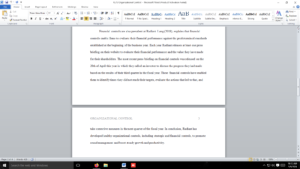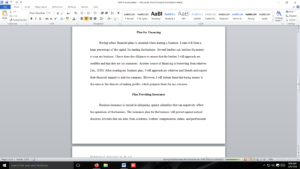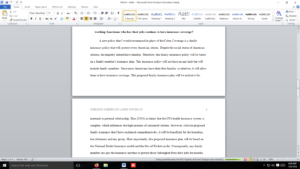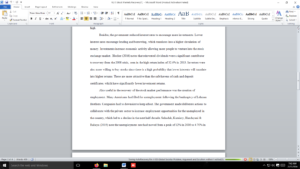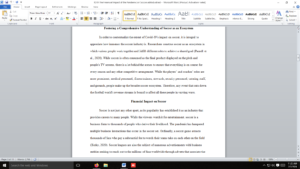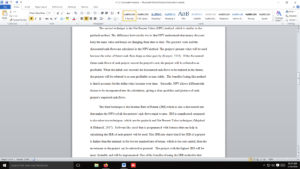Instructions: Please answer using your own words in a minimum of 400, maximum 500 words PER QUESTION SINGLE spaced. Referenced with two (2) peer-reviewed journal articles or qualified text publish within the past five years and follow APA Manual 7th editions scholarly writing guidelines. When writing replies, please provide your experiences, new ideas, add probing questions and new literature on the topic to enhance the learning opportunity.
Questions:
1.1. Major trends affecting the future of healthcare administration
After you read over the slide presentation posted for this weeks about some of the macro trends affecting the US healthcare system, think about how those trends may be affecting the future of the healthcare profession. For example, what do you think about these following future possibilities?
- Chronic Care Management companies take charge of care that keeps these folks out of the hospital as much as possible.
- Geriatric Care Management companies use mobile technology as an alternative to institutionalization of old people.
- Companies reduce the cost of care by moving services currently provided in a hospital to out in the community.
- New mobile, robotic, and AI technologies become standard tolls for improving quality by reducing variations in the provision of healthcare services.
- The overall healthcare marketplace remains nervous as it faces major changes in the Medicare program and the still unclear future of the Affordable Care Act, so it keep looking for all kinds of new ways to do more with less.
These questions are intended to get our thinking started.
What else do you see in the future of our profession as healthcare managers and administrators?
1.2. Empathy
A deep desire to help is common to those who enter healthcare. Yet, that compassion can be dampened by the demands of the workday.
By now, you should have viewed the Cleveland Clinic Empathy Video. What are your thoughts?
1.3. What will the job market look like in 5 or 10 years?
Lecture: While the US healthcare system represents around $3 trillion in annual spending and is the largest single sector of the overall economy, it also sits inside larger “macro trends” that help define the landscape of jobs.
For example, such factors as globalization, the frantic pace of innovative handheld and genomic technology (like the iPhone 6 and mapping the human genome project), 78 million Americans all hitting old age (and higher healthcare utilization) at the same time, and radically changing values and beliefs are all working together to create a larger “context” for new jobs in the healthcare system.
So what difference do all these big changes mean to us? The answer is both obvious and complicated. I will answer the obvious part and leave the complicated part to you to discuss.
The obvious answer is that these big changes are changing the way we live our lives. Just think that it wasn’t that long ago that classes on the internet like ours didn’t exist. And now, we just sort of assume, without even thinking about it, that such classes are perfectly normal.
So the obvious part is that such factors as globalization, technology, the aging of our society, and changing cultural values are all working together to change pretty well everything that used to be – into something else.
The hard part – and the part you need to think about – is what do all the changes really mean to the careers of healthcare professionals?
If we think that healthcare professionals will continue to do exactly what they are doing now over the next ten years then we are not paying attention to how much the work world has already changed from the way it worked ten years ago.
How will smart phones create new jobs in healthcare?
Will genomic research eliminate certain diseases by modifying DNA? What issues are raised by DNA manipulation?
How will the massive chronic care needs of the elderly create new career opportunities?
How will healthcare systems evolve to best leverage a global market for their services?
What new jobs may be created to best meet new consumer demands for more patient-focused care? Less institutionalization of the elderly? And better access to culturally appropriate care givers?
Answer Question:
So what do you think? What’s the job market likely to look like for you in ten or so years?
1.4 Introduction to Healthcare Financial Management
Read Hirsch, J.A., Harvey, H.B., Barr, R. M., Donovan, W. D., Duszak, R., Nicola, G. N., … & Manchikanti, L. (2016). Once you have read the article, discuss the Medicare Sustainable Growth Rate. “The SGR target is calculated on the basis of projected changes in 4 factors:
1) fees for physicians’ services,
2) the number of Medicare beneficiaries,
3) US gross domestic product, and
4) service expenditures based on changing law or regulations (Hirsch, et al. 2016).”
How have these 4 factors been tied to fiscal performance? Find some additional sources and support your position through an original post in a few paragraphs. Once you have completed your post, review the link of at least two of your peers.
1.5. Health Insurance, Managed Care and Reimbursement Methodologies
Cost accounting is one of the most challenging areas in accounting to understand. “A cost accounting system is a system for recording, analyzing and allocating cost to the individual services provided to patients (e.g., medications, procedures, tests, room and board) (Becker’s Hospital Review, 2014). The healthcare industry has been working toward the goal of correlating cost with quality. Read Porter, M. E., & Lee, T. H. (2016). From volume to value in health care: the work begins. Jama, 316(10), 1047-1048. Discuss how healthcare providers and patients can benefit when cost is correlated with quality of the healthcare services provided. Post an original discussion of a few paragraphs and support your statements with research.
Financial reporting is critical to the success of any organization because this is how managers and other stakeholders evaluate the sustainability and profitability of an organization. The healthcare industry accounts for nearly 20% of the US GDP as of 2018 (BEA, 2019). While there is guidance for financial reporting to the respective government agencies, there is no consistency in the development of financial reports among private healthcare organizations. Discuss the importance of consistent financial reports across all healthcare organizations. Support your statements with research and post your discussion in a few paragraphs
Answer preview
Most people do not look forward to going through a health care experience, primarily because of the negative emotions associated with such an experience (Moudatsou et al., 2020). For example, when a person gets diagnosed with terminal cancer, they are more likely than not to start experiencing hopelessness. However, embracing empathy, especially on the part of the health care professionals, will help turn such an experience from a nasty one to a slightly better one. One of the benefits of embracing empathy within the health care system is that it improves patient outcomes. Empathic engagement is the cornerstone of a fruitful patient-physician relationship (Moudatsou et al., 2020).
[2943 Words]
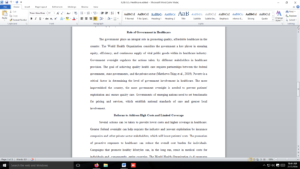
US Healthcare System
